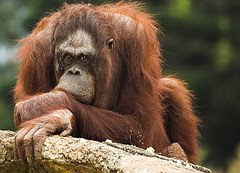
I went to a lecture given by Leif Cocks the President of the Australian Orangutan Project and was very moved by the what I heard and saw. Orangutan populations are being decimated by the palm oil plantation companies to produce the biofuel palm oil. They are being clubbed with rifles, excavators and machetes. Their habitats are being destroyed and burnt. I have written to a number of organisations voicing my concerns, but this seems to fall on deaf ears. They write back the same old sob story that they are part of the Rountable for Sustainable Palm Oil and that they are concerned about the welfare of the Orangutans. However, sitting at the back of a desk writing out theories and plans and objectives has done nothing for the plight of this gentle and gracious cousin. Sharing 97% of our genes and with the intelligence of a 5 or 6 year old child, how can we be satisfied that a few pieces of paper written in the Western world following Western ideology are sufficient? It seems to me that this is piece meal conservation. If we set up a roundtable and show our objectives it will quell the population and their concerns are met. I have lived for 20 years in a third world country (Zimbabwe) and had to leave in 2000. I know from experience that the Western ideology and values are often not shared in these countries, needless to say this is the case in Indonesia and Borneo imbued in a different culture.
The majority of the population is poor, they are concerned with feeding a numerous and ever growing family and will do what ever it takes. It seems to me that it depends on where you are on Maslow's Hierarchy of Needs as to whether you are capable of shifting attention and priorities towards causes such as conservation. In the West we are in, what I call, a different life cycle, have more opportunities to educate ourselves and are thus more concerned about the welfare of the planet and flora and fauna inhabiting it. On the other hand, it is our ignorance that is fueling this ever growing need for palm oil. We are consumers we believe we "need" all the products marketed in our society. After spending 3 weeks in the jungle without communication including TV I can tell you I needed nothing than the clothes on my back a bit of soap, shelter, food and water. So how can the few who have changed their mind set assist others to do the same? If we had the answer I would be changing mind sets relating to this issue without delay. However, we all have differing perceptions. Maybe the answer has already arrived maybe the economic crisis will force people to realise its not the material wealth that is our essence but the ability to see beauty in ourselves. others and the sentient beings that inhabit this garden of eden. Make no mistake I am not religious, however, I do know that animals should be understood on their terms and should be respected and appreciated.
There are so many facets to this growing issue that cannot be addressed in one short blog. The economic prosperity of a third world country is undermined by the termination of palm oil growing. Conversely, rainforest devastation accelerates climate change, bringing floods, mud slides and bush fires to say the least. Thus leaving the inhabitants with no food, shelter or the little infrastructure they had to start with. Embroiled in this ugly tale are the inhabitants of the rain forest themselves. Not only may the Orangutans become extinct in 10 years but also the flora and fauna for which both Indonesia and Borneo are reknowned for. I was lucky enough to visit Borneo a few years ago and see Orangutans and Proboscis monkeys for myself. I have to say I was in awe of these creatures. To think that they may soon be gone for the sake of palm oil is not an option for me. We are outstripping our resources is the bottom line. This begs the question is this part of the reason why our society is collapsing? Jared Diamond may agree in his book Collapse! Biofuels may not the answer, maybe a change of lifestyle? A question for another blog I foresee as it is just as multifaceted and complex.
The Centre for Orangutan Protection (COP) has been set up by Indonesians (about 20) to try and help stranded, injured and abused Orangutans. Often risking their lives to save Orangutans. One of the members explained that 'it is like I am mopping the water off the floor but the tap is still running and just never stops'. I wonder if there is potential for a compromise? 14 Orangutans a day are dying and the orphans are scared and traumatised if they survive. Either they are taken for the pet trade or if they are lucky to an orphanage where they are rehabilitated. However, many of the centres are now over flowing with orphans and there is no where to put them. With the devastation of their habitat how can they be rehabilitated and then returned to the forest, and what is their future?? It looks bleak to say the least.
Here is a video from the COP (it is not uplifting and there may be some grafic images):-
I hope this blog can bring some awareness for this issue and I hope that I can make a difference for these gentle creatures, in my small way.



